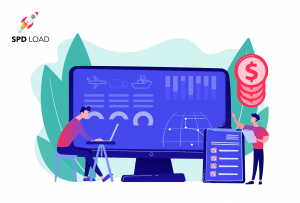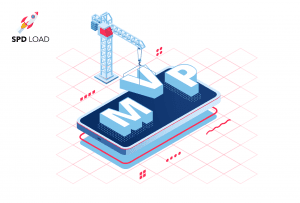How Much Does It Cost to Design a Mobile App (Full Breakdown)
- Updated: Nov 14, 2024
- 14 min
Is sticker shock getting you down? We hear you. Mobile app design costs can be confusing.
Today, we’re breaking down exactly what goes into building a great app.
Creating an app can be complex, but these app development tips simplify the journey.
We’ll explore real-world price examples for different project types. Most importantly, we’ll share insider tips on choosing vendors who won’t drain your wallet.
Too busy for a long read? Skip straight to our new infographic revealing average price ranges.
Start your journey with our expert developers to bring your app idea into reality - contact us today!
What’s the Cost to Design a Mobile App?
The average app design cost varies from $3,000 to $30,000. This is quite a wide range that depends on a few factors: the complexity of an app idea, the type of team, and the team location.
Let’s take a look at the app design price breakdown based on these factors.
Cost Based on Complexity
The app’s complexity is equal to the complexity of the product idea: the number of roles, screens, unique features, usability, and visual design. These parameters determine the viability of the business model.
The simpler the business model and the challenges you solve, the cheaper the app design process will be. Usually, the easier the design, the more affordable the mobile app development.
Let’s look at a few examples with conditional complexity.
| Complexity | Average cost, $ |
| Simple App Design | 3000 |
| Average App Design | 12,000 |
| Complex App Design | 30,000 |
Keep in mind that this is an approximate value. In situations with complex back-end features, such as AI/ML integration, design can be inexpensive, but app development can be costly.
Cost Based on Team Type
Besides the complexity of the product concept, the development team is the second crucial factor that defines the design budget and software development.
We’ll use the average-size app, which requires 300 design hours to build, as a basis for calculations.
| Type of a team | Average cost, $ |
| In-house team | 36,000 |
| Local design agency | 48,000 |
| Outsourcing agency | 12,000 |
| Freelancers | 6000 |
We will consider each type of team and talk about how a development company’s location can affect pricing.
Cost Based on Team Location
Please note that the complexity of an idea defines the expertise level required to develop an application.
At the same time, an experienced app development company you hire offshore can cost less than a team with fewer years of experience based in the US, UK, or Western Europe.
We’ll use the same example: an app of average size, which requires 300 design hours.
| Location | Average cost, $ |
| Australia | 36,000 |
| The US | 48,000 |
| The UK | 40,000 |
| Western Europe | 28,000 |
| Eastern Europe | 12,000 |
| South Asia | 6000 |
There are many factors to consider when choosing a design partner, such as budget, quality requirements, and niche expertise. We’ll share the checklist to help you choose the right partner later.
Now, let’s look at the design aspects that shape the price. 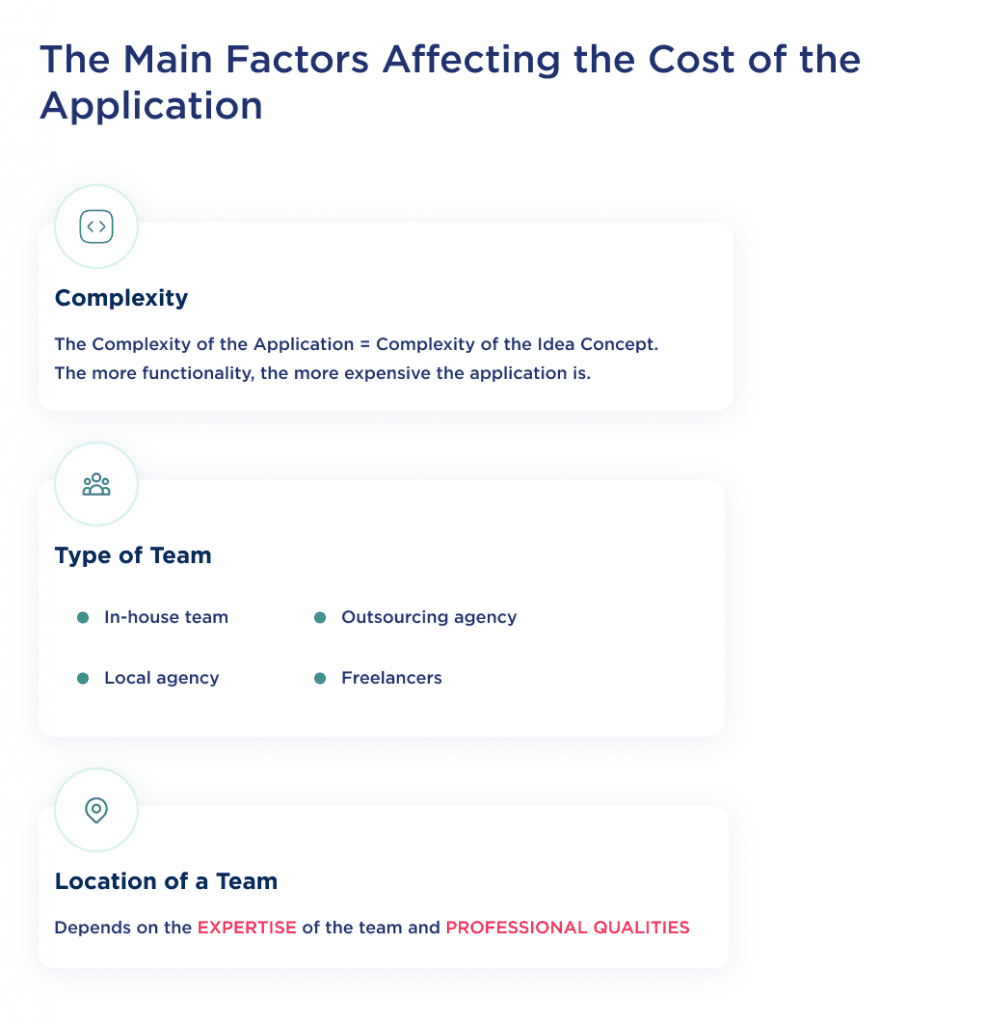
What Factors Influence Mobile App Design Costs?
In this section, we will discuss in detail the technical aspects that determine the price and duration of app design and development.
Here are a few factors to consider.
Factor 1: Design Type
There are two types of app designs that you can implement. And the price for both of these services will be different.
Type 1. Custom Design
The custom design of a mobile app means you need to create a User Experience and User Interface from scratch instead of using premade libraries.
The cost of designing an app will most likely be higher than the cost of designing a native app. While the latter is much more effective, it is also risky.
| Pros | Cons |
|
|
Almost every phone app has a custom design: Uber, Lyft, Tinder, Bumblebee, and Airbnb.
A customized design will bring groundbreaking success if you do everything right and understand the customer’s perspectives, engagement levels, and pain points.
However, as an alternative option, there is a native design. 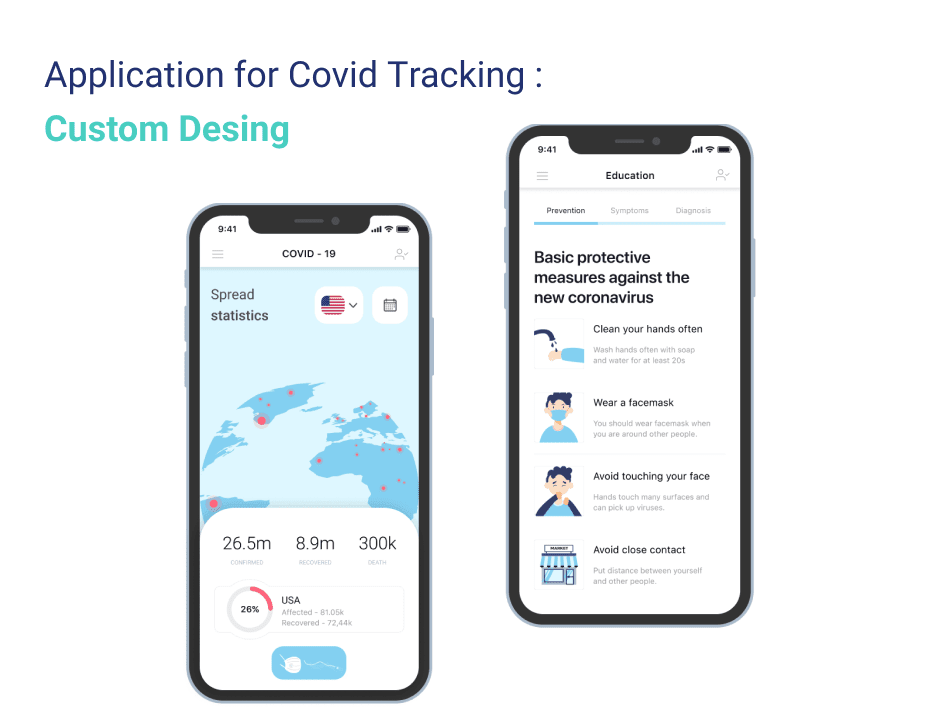
Type 2. Native Design
Nativity to a mobile app design means following the platform-specific design guidelines and element placements. For instance, with the iPhone, the button to “Go Back” is always on the top left corner of the phone screen.
iOS, Android, and other mobile device platforms have some set precedents for how everything looks on the screen.
Designing applications using native guidelines reduces design costs compared to custom design.
| Pros | Cons |
|
|
Examples of apps with native designs are WhatsApp and Twitter. 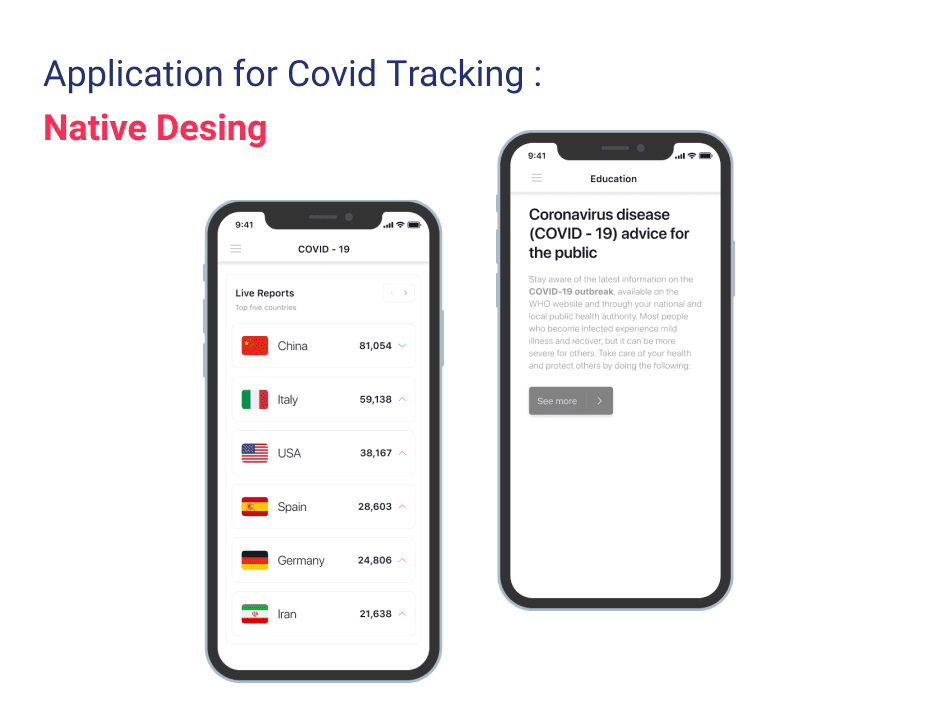
Another critical factor is the app’s complexity. Let’s research it in more detail.
Factor 2: App Complexity
In terms of design, the app’s complexity is the number of unique screens, specific blocks, and exclusive interaction in its features. But we will decompose this aspect further:
Number of Roles
One of the first things you need to define is the number of team roles for your design project. The more unique features you want to implement, the more UI/UX designers you need to find.
For a project of average complexity, you may need not only a project manager but also specialists who will be responsible for:
- Creating a user persona
- Sketching app wireframes
- Working on app prototypes
- Developing an intuitive app interface
- Making necessary changes after testing and target audience’s feedback
Explore our web design services
Number of Screens
Your application needs several basic screens and a number of platforms. But you can go further and leverage the power of screens in various places of the application. Here, you can use:
- Welcome screens
- Onboarding screens
- Login screens
- Screens to indicate the next steps
- Screens containing buttons and icons
- Menu screens (hamburger menu)
- Other screens and pages like Errors.
If you ask how much it costs to have an app designed with numerous screens, especially with animation, the answer will probably be higher than the average cost.
Number of Features
Here, the app design cost will depend on:
- The platform of the app development process (iOS app, Android app, cross-platform, etc.). These detailed guides on Android app development costs and iOS app development costs will help you navigate the financial aspects. If you decide to build an iOS app, this guide on the best iOS app development tools covers everything from prototyping to testing.
- Type of the product and type of app. Are you designing an MVP or a full-scale application with every tidbit added? In case of MVP, check out our MVP development services for further insights.
- Including sophisticated technologies such as AR, VR, AI, ML elements, and so on.
- Adding some unique elements for a specific cohort of users.
Depending on these factors, you will get an estimated number of hours required.
Your choice of the type of service provider will also change the app design cost. Let’s see how exactly. 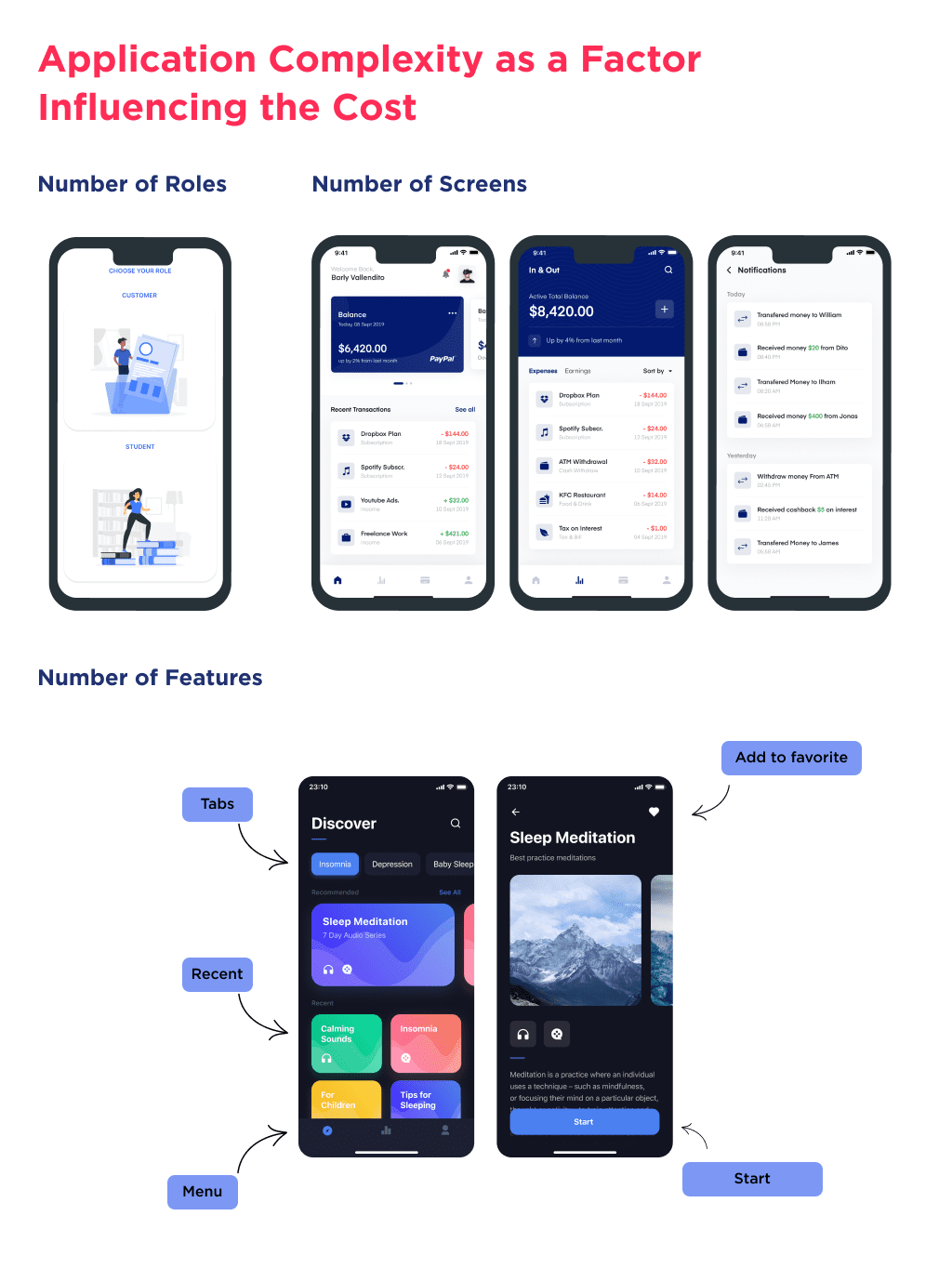
Factor 3: Team Type
Who designs the application? Are you hiring a local agency, a group of freelancers, an in-house team, or outsourcing? The hourly rates of these players are different.
Let’s see what to expect if you hire an in-house team.
Type 1. In-House Team
In-house specialists are employees who work directly for the company. Like any other form of collaboration, there are advantages and disadvantages to this type of arrangement, which we will discuss below.
| Pros | Cons |
|
|
Hiring in-house teams can be cost- and resource-consuming as it requires a lot of additional work.
The other option is hiring a local design agency.
Type 2. Local Design Agency
You can also hire a design agency within your local proximity. Let’s break down the significant pros and cons of the cost of designing an app by a local design team.
| Pros | Cons |
| The local team understands your market. | There can be limited views on the overall perspectives. |
| You’ll get better communication and faster updates. | You can’t change the team’s personnel. |
| You can work with a team in person and participate in all the processes. | The cost can be higher depending on the location. |
| The team can use local resources, brand ideas, and networking. | The quality of work can vary. |
Hiring a local agency in the USA can cost you $150 per hour. The other option is hiring freelancers.
Explore our UX&UI design services
Type 3. Freelancers
Hiring freelancers means you can choose specialists on your own. This approach has its pros and cons, too.
| Pros | Cons |
|
|
The average pricing for freelancers involved in design ranges between $15 to $25 per hour.
This brings us to the last but one of the best options. Hiring an outsourcing agency.
Type 4. Outsourcing Agency
Hiring an outsourcing agency means hiring an agency located in another country, like Ukraine, for example.
It can get you lower rates and perfect quality. Everything depends on the time you need to provide input on all the elements of design. For instance, sketches, basic designing, branding, meetings, quality assurance, and so on.
Looking for quality and cost balance? Here are the best countries to outsource software development.
Let’s see the main pros and cons of this option.
| Pros | Cons |
|
|
Hiring an outsourcing agency in Ukraine can start from $40 per hour.
What is usually included in the design process, and how does it impact the app design cost? Let’s go through this process in detail. 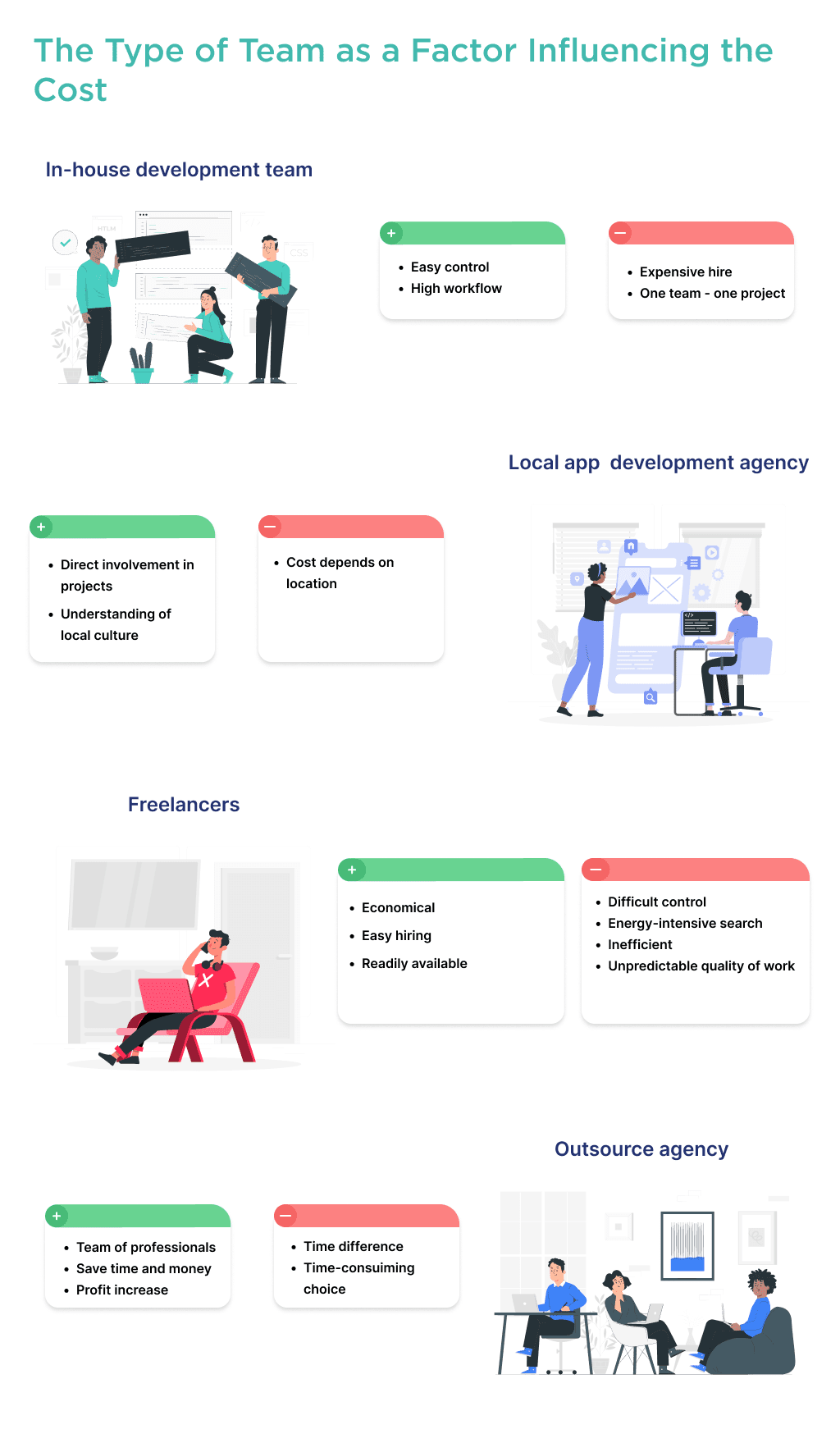
How Does the Design Process Affect Costs?
By taking an overview of both UI and UX elements, we will examine which tools can be used, the benefits of addressing these concerns, and how to approach them.
Let’s begin with the application UX.
UX Design’s Impact
UX design takes a major part in the whole mobile application UX/UI design process. Approximately 70% of the design budget is allocated towards using User Experience services. Why?
The role of UX design determines the way your future product will work. Your concept becomes visual precisely at the UX stage.
In addition to realizing your vision, UX also takes care of achieving your business goals as a founder, as well as user objectives. In fact, UX defines the scope of work in the development stage.
Let’s look at the UX process details:
- User research
- Mind mapping
- Low-fidelity prototypes
- High-fidelity prototypes
Let’s take a closer look at each point.
Step 1. User Research
During the research phase, we will identify the kind of research you require.
Make sure the business analysts conduct thorough research on the business model and technical aspects of designing the app.
Under user research, we want to answer questions like:
- Who are the ideal application users?
- Who are buyer personas?
- What are the goals that you want to achieve with the application?
This stage dramatically impacts the final cost of the app development. Here, we observe new application development trends emerging in the market and understand what functionality we can add.
During the research phase, we execute mind mapping. 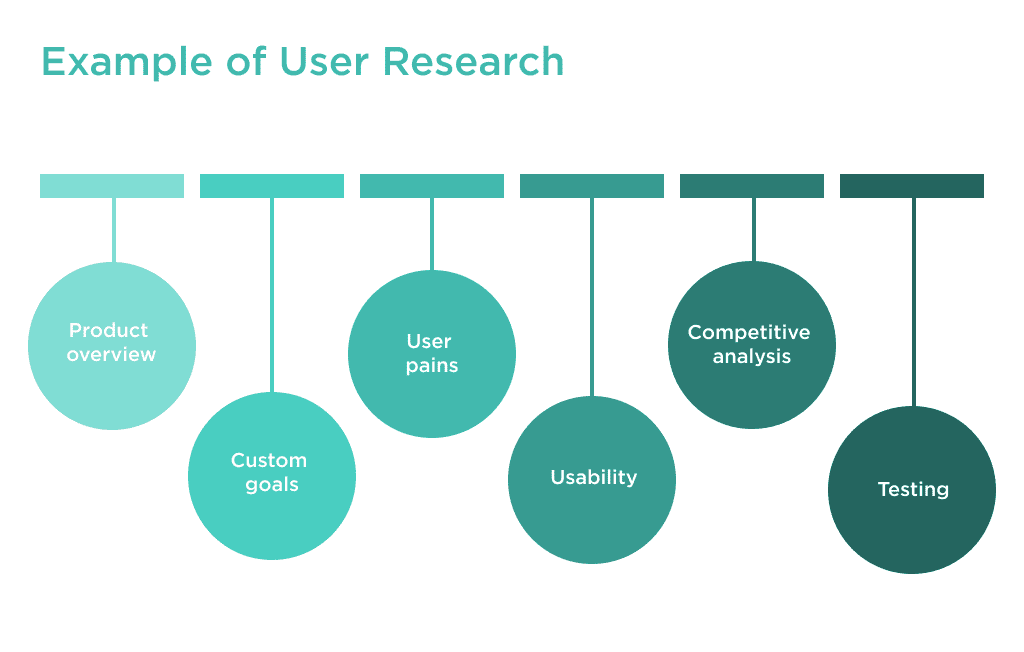
Step 2. Mind Mapping
Mind maps use a two-dimensional layout to show the relative importance of each subject.
You can use the mind maps for:
- Showing the steps
- Informational hierarchy
The best part is that Mind Maps are relevant for every project stakeholder. They help the viewer understand the core functions and critical branches of the project.
Mind maps are essential from the perspective of mobile app design price.
More sophisticated applications with a user base of thousands create specialized maps – Ontology Maps.
In terms of other tools, the designers use prototypes of different fidelity. 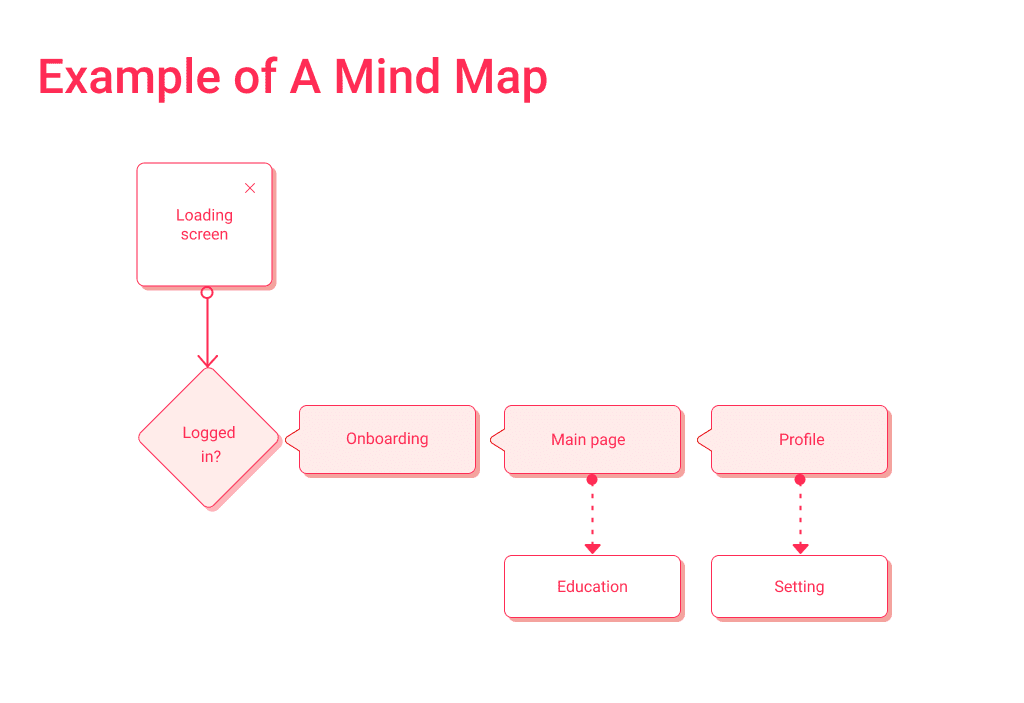
Step 3. Low-Fidelity Prototypes
Low-fidelity prototypes often don’t involve user interactions. The design team uses them to collect and analyze feedback.
Low fidelity shows the placement of elements. It helps us understand what goes where in the application design and layout.
Think of it as the skeleton of your application. It does not have any color, vector shapes, and other elements.
For low-fidelity prototypes, you can use paper sketches. They become essential when you have an intricate application design and a lot of screens to cover.
However, if you are focusing on minimum viable application development, sketches can be left out.
Step 4. High-Fidelity Prototypes
High-fidelity prototyping includes wireframes, i.e., sketches created using the software. For example, we use Figma. It is the next level of creating a great application design, impacting the mobile application design cost.
Also, high-fidelity prototypes are created with interactions.
After completing the User Experience and its attributes, let’s move on to the User Interface.
And yes, UI also brings a difference in the app design cost. 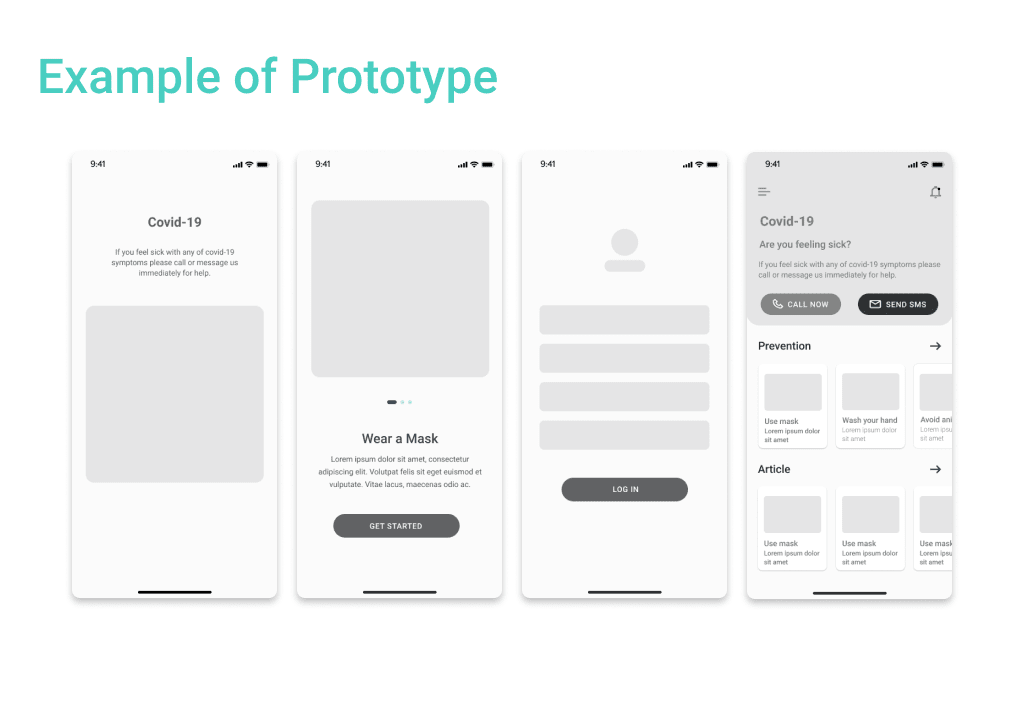
UI Design’s Impact
User experience is how the application feels, and the user interface is how the application looks.
With UI, we have four different elements to cover:
- Color Scheme
- UI Kit
- Icons and Logo
- Animations
Let’s consider each point in detail.
Step 1. Choose a Color Scheme
The app user interface design is about communicating your vision to the users. Every element that you add to the application has to engage with the user.
In UI design, you must take care of color psychology. Here, it’s essential to understand the impact of every type of color on your users.
Step 2. Create a UI Kit
UI Kit is a time-saving element of the application.
Using a great UI Kit like Lovely UI or Pttrns will undoubtedly reduce the app design cost. It provides you with ready-made elements of app design. It is excellent, efficient, and provides us with the requisite details.
Not only will you find the items and elements of the UI conducive to your design and the client’s vision, but you can also customize them as needed.
For an agency, every bit of delay reduces the accountability and reliability of your company.
For an owner or founder, the time it takes for an idea to cross the four walls and reach outside is paltry. 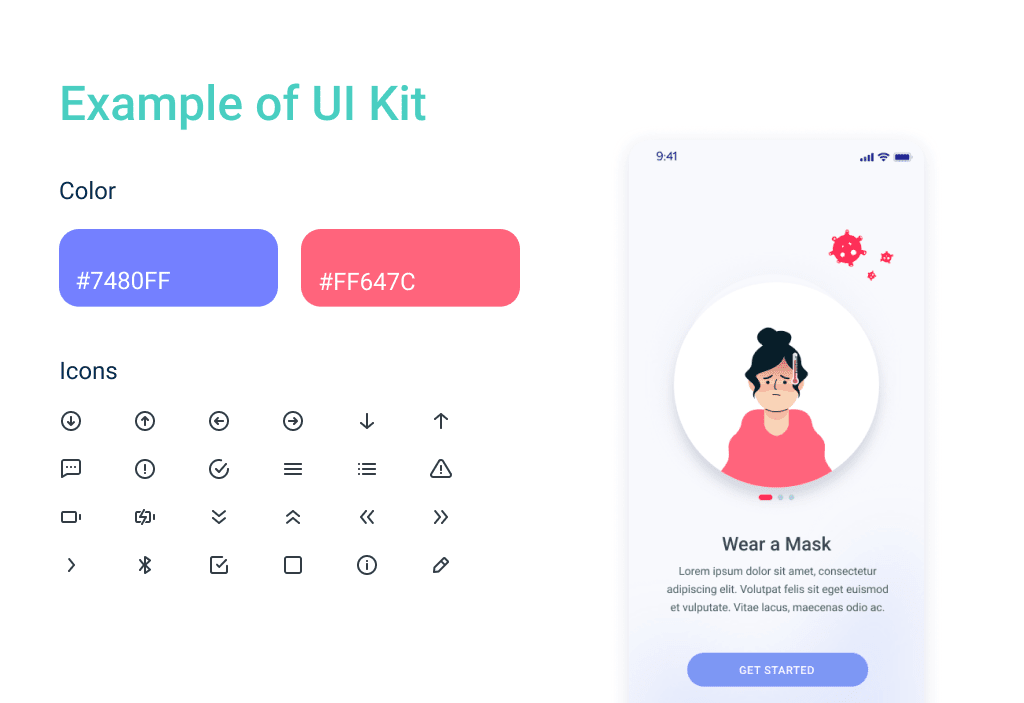
Step 3. Design Icons and Logo
Every element in the UI design is a way to communicate with your users.
Apple, Nike, Reebok, Starbucks, and McDonald’s don’t need to write their names in the adverts. We recognize them with symbols.
These brands have set a benchmark of some unique qualities that resonate within the market.
For your logo making, take care of three qualities:
- Trustworthiness. You must build your value proposition as an authentic and reliable service provider.
- Awareness. Implies your recognition, demonstrated by the logo.
- Emotional attachment. The result of trust and awareness.
The cost of designing an app may rise for a good and impactful logo, but the money you invest here will be worth it.
If you are on a strict budget, use a business name generator and a logo maker. 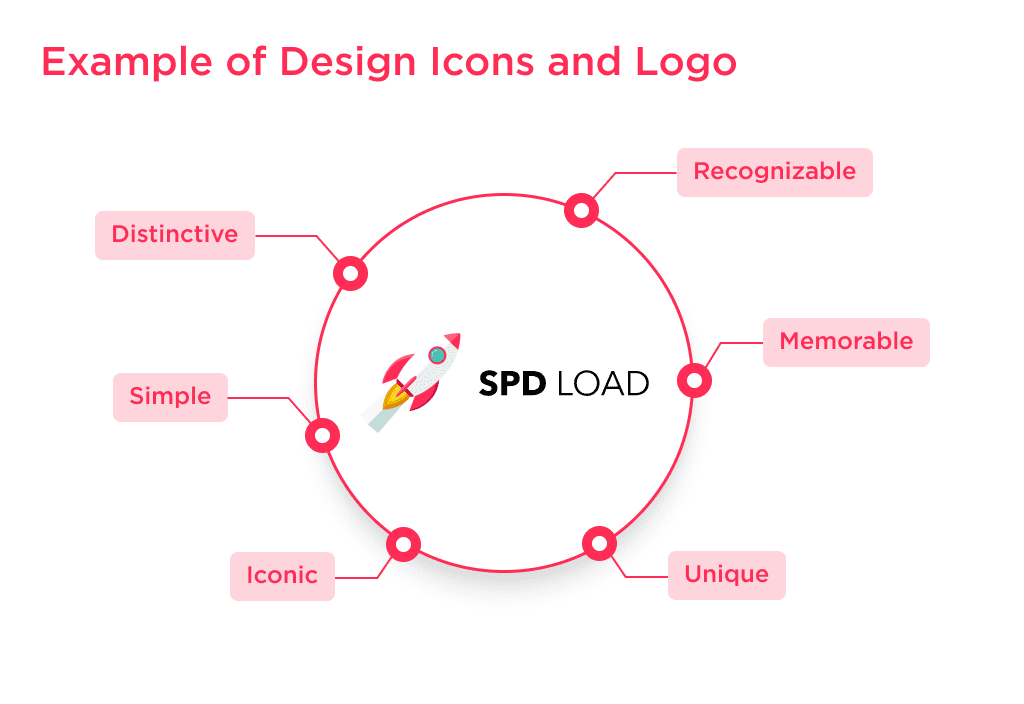
Step 4. Design Animations
Animations help deliver several aspects of a great design.
They assist with:
- Reducing the cognitive load put in by a user.
- Gaining attraction and appeal.
- Redirect user attention towards the significant aspect of the page.
- Easier understanding.
You can leverage the power of animations in various places of the application. But if you ask how much it costs to design a mobile app with animations, the answer will most probably be higher than average.
And as an example of animated onboarding, take a look at our dating app design.
To better understand how to choose an app design partner, look at these tips we collected from our practice.
Hire outsourcing experts from SPDLoad.
3 Tips for Choosing an App Design Company
- Check the Portfolio. Obviously, when choosing an app designer, you need to pay attention to the portfolio. However, there are a few things to pay attention to:
- Beautiful design is subjective but also not as important as UX;
- Note the industries the team has worked with;
- Notice how transparent, detailed, and accurate the design process is.
- Check the Testimonials and Social Media. The next point is to check reviews from previous clients. You can check the site, Clutch, Linkedin, or other listings. Pay attention to the team’s strengths from customers’ words and compare them with your expectations.
- Conduct an Interview. Finally, the “strongest” way to see if a team is right for you is to talk in person. After all, we are all human. Actually, finding a common language is one of the fundamental principles of successful collaboration.
Now that you have understood the major aspects of mobile app design cost, you need someone to help you. 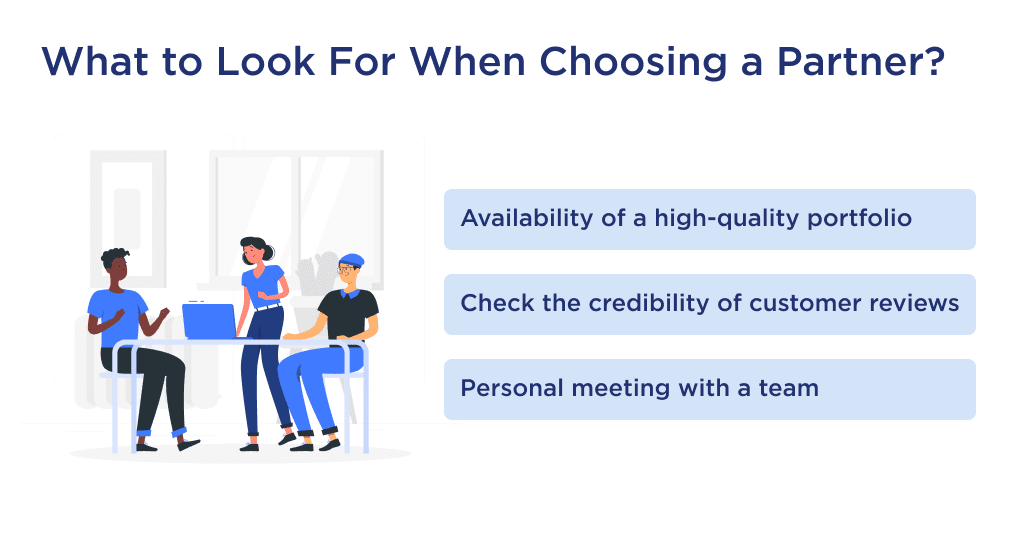
Looking for an App Design Team?
Pricing out app design is complicated – from conceptual work to meeting industry guidelines, costs add up quickly. But for startups, flipping norms through groundbreaking innovations takes skill.
That’s where we shine!
SpdLoad offers full-service mobile app design and development crafted to build profitable, valuable products entrepreneurs love.
Ready to chat about your big idea? Drop us a line!
Our team can assess your project goals, brainstorm possibilities, and provide custom quotes and timelines so you know what to budget.
Being a Clutch Leader in Ukraine speaks to our dedication and hard work in the software development field.
Let’s talk – we can’t wait to help make that lightbulb moment a reality.
Bonus Infographic
Here’s a summary of our in-depth guide. Learn about the highlights of the cost of app design in 2025.
Want inspiration for your website? Check out these examples of good web design for ideas. 




